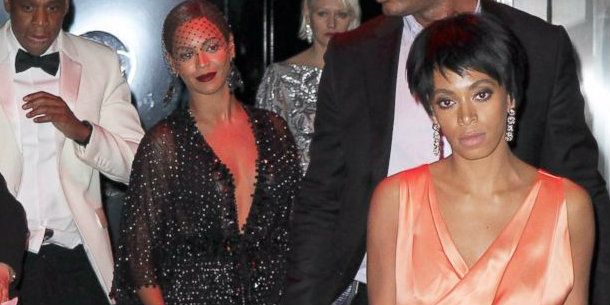America's Favorite Punch Line: On Solange, Beyoncé, and the Pathologizing of Black Womanhood

I woke up this morning to articles and blog posts updating the world on hip-hop mogul Jay-Z and singer Solange Knowles. It seems that we should all be aware that the two were spotted jewelry shopping together on Tuesday afternoon, just a day after the now-infamous videotaped elevator-altercation-turned-virtual-minstrel-show went viral. According to my Facebook newsfeed, Jay-Z was attempting to solve his “100th problem” with an expensive gift.
Between the onslaught of memes, domestic violence jokes, and speculations accompanying the trending topic #WhatJaySaidToSolange—all of which began Monday—it appears that the media frenzy has devolved into yet another instance in which the Black woman serves as America’s punch line.
As of 1PM Tuesday, the video in which Solange appears to repeatedly hit and kick her brother-in-law Jay-Z while on an elevator, garnered over 10,0000 comments on self-proclaimed “#1 urban outlet” WorldStarHipHop. While scrolling through comments, I instantly noticed the repetition of affective terms used to describe Solange: “angry,” “emotional,” “bipolar,” “crazy,” “psycho.” It is necessary that we place these historically racialized terms within a centuries-long genealogy of rhetoric that has been perpetually rehashed to pathologize Black women. I am thinking about the sassy Sapphire caricature that gained popularity in the early 1900s, Ronald Reagan’s mythical Welfare Queen used to incite racial animosity and resentment in the ‘70s, the continual framing of First Lady Michelle Obama as “militant, angry black woman,” the caricaturing of Rachel Jeantel throughout the Trayvon Martin trial.
Then there is the juxtaposition of Solange and Beyoncé. It seems that Black women are damned if we do, damned if we don’t. According to WorldStarHipHop commentators and strangers on the bus and sidewalk, Solange hitting Jay-Z is “ghetto,” “ratchet,” an outcome of her “mental instability.” In contrast, Beyoncé’s “just standing there” in the elevator, in between her sister and husband, is simultaneously “classy” and “shameful.”
Such comments, tweets, and memes serve as critical reminders that being born a woman of color comes with the unspoken agreement that we will serve not only as the mule of the world but the butt of every joke.
In light of the global campaign to #BringBackOurGirls, I have been trying to convince myself that these deeply rooted perceptions of Black women within the popular imagination as irrationally "emotional" and valueless are beginning to uproot. Or, that at least with this seemingly newfound visibility will come more than our commodification.
Photo credit: X17
Jasmine Salters is black feminist writer and doctoral candidate at UPenn. Her research interests include black feminism(s) and black women's literature, black sexual politics, and sex work and citizenship studies.

No comments: